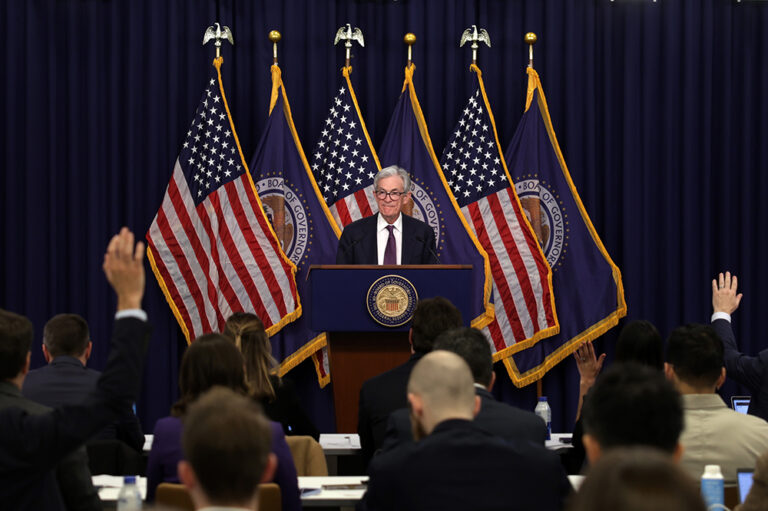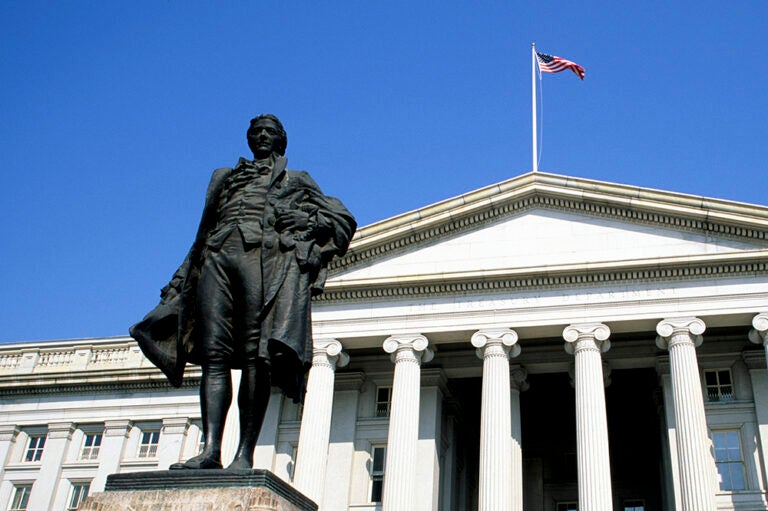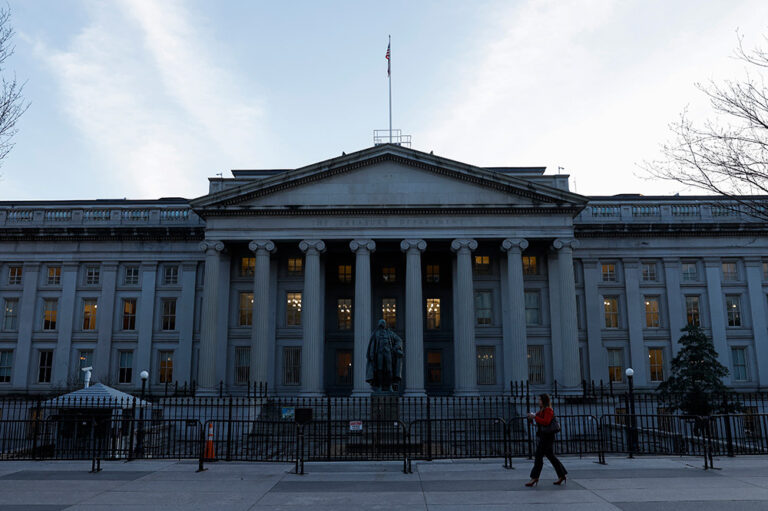With our economy in recovery, the national debt rising unsustainably, the country still grappling with a devastating pandemic, and lawmakers pursing significant new legislation, America faces many critical questions for its future. To shed light on the best way forward, two top economists participated in a panel discussion as part of the latest edition of the Peterson Foundation Economic Forum.
William Gale, the Arjay and Frances Fearing Miller Chair in Federal Economic Policy at the Brookings Institution, and Sita Slavov, Professor of Public Policy at George Mason University’s Schar School of Policy and Government, joined Foundation CEO Michael Peterson for a wide-ranging conversation on Tuesday. Gale and Slavov also authored two of the 10 new papers that comprise the Peterson Foundation’s new initiative, Where Do We Go From Here?, which offers a diverse array of perspectives and solutions on America’s fiscal and economic challenges.
In gauging the state of the nation’s economic recovery and fiscal situation, Gale and Slavov agreed that the economy has rebounded significantly from the lows of the pandemic, but that difficult questions remain for policymakers when it comes to inflation, interest rates and labor market factors.
Gale said the economy has come back relatively fast, thanks in large part to quick action on pandemic relief and stimulus measures, but cautioned that the low aggregate unemployment rate masks high rates for minorities. On fiscal health, Gale said that nearly all indicators are unfavorable, and that his primary concern is “interest rates, interest rates, interest rates.”
“If interest rates stay low, the situation is manageable for a long time,” he said. “If interest rates start rising, the situation gets ugly fairly fast.”
Slavov shared related concerns about inflation, interest rates rising, and the unanswered question of why people are not returning to work at pre-pandemic rates.
“Right now, the biggest risk to the economy is inflation. That’s something that seems to be picking up, and it’s something that policymakers should really be concerned about,” Slavov said. “I would be concerned about longer-term inflation. I’m not sure that it is transitory. Action needs to be taken.”
To address the nation’s longer-term challenges, both agreed that it will be less painful to act sooner on priorities like Social Security and Medicare, tax fairness, the rising national debt and creating greater economic opportunity for current and future Americans.
Slavov noted projections that the nation’s debt-to-GDP ratio is on track to grow to an unprecedented 200%, which, she said, would pose large burdens on future generations and put America at risk of a financial crisis. Arguing for progressive reforms to entitlement programs, she said that projected shortfalls in Social Security and Medicare would impact lower-income people the most.
Acting earlier, Slavov argued, would help “put these programs on a sound financial footing, because the uncertainty about their future does tend to disproportionately hit people who are vulnerable.”
Gale advised that lawmakers address the safety net, economic inequality, and the national debt simultaneously, starting by raising revenue from the most affluent households and corporations.
“The fiscal outlook, tax reform, social policy, the response to the pandemic — they’re all linked,” he said. “We can address all of these things at the same time, but if people refuse to address one of them, like raising taxes, that makes it hard to address the other issues.”
Slavov called for broadening the tax base to credibly and fully pay for priorities, an approach that Gale largely agreed with but he also advocated that taxing the wealthy must happen first.
“Politically and economically, I’m surprised that the next step is not taxes on incredibly affluent households,” Gale said. “We can’t do all of this by taxing the rich. But it seems like it’s the right next step.”
Regarding tax structure and the potential for new forms of revenue, the two discussed the potential benefits of a carbon tax and a value-added tax.
“These taxes tend to be more pro-growth,” Slavov said. “A value-added tax is essentially a tax on consumption, it does not penalize investment and savings. A carbon tax addresses a market failure. We probably need more revenue, and we should turn to these more broad-based, pro-growth sources.”
“Eventually, we’re going to need both a VAT and a carbon tax,” Gale added. “The key issue is how the revenues from those taxes get spent.”
In discussing the Democrats’ Build Back Better proposal and considering other fiscal policy options, the pair shared slightly differing views on new spending but suggested that certain tax reforms are needed.
Gale said that Build Back Better does a “fairly good job on the spending side,” noting its provisions for clean energy, affordable child care, and universal pre-K. He said that expanding federal programs to help vulnerable populations directly in a low-interest-rate environment can pay off for the economy and budget in the long run.
Slavov said that popular components of Build Back Better, such as paid family leave and expanded child tax credits, could make sense if the costs are covered.
“The real concern I have with the bill is the financing of these programs,” she said. “I don’t think it’s going to end up covering the actual costs. I’m also not sure it makes sense to add more social programs, when existing social programs are facing financial shortfalls that nobody seems to want to deal with.”
To help raise additional revenue, Gale further advocated for increasing the corporate tax rate, ending the pass-through deduction, and increasing the estate tax. Both recommend against lifting of the state and local tax cap, which, better known as the SALT deduction, which largely benefits higher-income earners, and were in favor of exploring capital gains tax reforms.
“Right now there’s this enormous loophole [for] capital gains at death, the basis of those assets are stepped up so that the assets are inherited at the current market value and the capital gains that accrued during the initial investment lifetime are never subject to tax,” Gale said. “The simplest thing to do would be to not allow the basis to step up. A more appropriate thing to do would be to tax the gains at death.”
Regardless of what happens with pending legislation and revenue raising proposals, both agreed that America’s fiscal outlook and structural budget issues affect its global influence and economic future. Slavov cautioned that at some point the appetite for U.S. debt may wane, while at the same time our debt load will reduce America’s capacity to address and emerge from crises. Gale said a valid consideration and concern for lawmakers is the $112 trillion in debt that the United States would incur over the next 30 years absent of action on solutions.
“Who’s going to buy it? I don’t know what the answer is,” Gale said, “but that’s a lot of money and good to think about.”
Image credit: Getty Images
Further Reading
The Fed Reduced the Short-Term Rate Again, but Interest Costs Remain High
High interest rates on U.S. Treasury securities increase the federal government’s borrowing costs.
What Types of Securities Does the Treasury Issue?
Learn about the different types of Treasury securities issued to the public as well as trends in interest rates and maturity terms.
Quarterly Treasury Refunding Statement: Borrowing Up Year Over Year
Key highlights from the most recent Quarterly Refunding include an increase in anticipated borrowing of $158 billion compared to the same period in the previous year.


